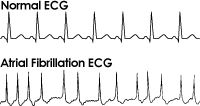Atrial fibrillation is a term that defines both the location and the nature of one particular type of arrhythmia (abnormal heartbeat). "How Atrial Fibrillation Works" explains what it is and how it forms.
Because atrial fibrillation (AF) can lead to some pretty serious complications, including stroke and heart failure, it's important to figure out that you have it before they happen.
Advertisement
Some people have atrial fibrillation without any signs of the odd rhythm, but the erratic, uncoordinated way the heart with atrial fibrillation tries to beat usually gives some clues that something's wrong. You might have palpitations, where you notice your heartbeat more than usual. And if that happens, you'll undoubtedly notice that the beating is not the regular thump-thump-thump you are used to. Instead, the pattern will be irregular.
With atrial fibrillation, your heart doesn't send the smooth, steady electrical signals from the upper to the lower chambers the way it does when the rhythm is normal. As a result, your heart doesn't pump as efficiently as it should. You might feel short of breath, for example, and you might get dizzy or weak and feel like you're going to pass out. If atrial fibrillation goes on long enough, your heart may not pump enough blood to itself, and this can cause chest discomfort. All these troublesome things happening to the body make some people feel very anxious.
Unfortunately, lots of other conditions can cause similar symptoms. Just because you have shortness of breath or dizziness or palpitations doesn't necessarily mean you have atrial fibrillation. Fortunately, a careful examination with a few special tests can make the diagnosis easy.
You can get a pretty good idea for yourself. Simply feel you own pulse. If you have atrial fibrillation, what you will feel is a very irregular pulse. The beat will follow a seemingly random pattern, and the throbbing of the pulse against your finger will vary in strength from beat to beat. This is such a reliable clue that the American Stroke Association recommends that you take your pulse for a minute or two every month.
If you think your pulse is irregular, then you should see your doctor. The doctor will ask questions about what you have experienced and then give you a physical exam, during which he or she will check your pulse, listen to your heart and lungs, and look for reasons you might be having these symptoms.
Your doctor will order an electrocardiogram (EKG), a test that measures your heart's electrical activity. Atrial fibrillation will show up as a rhythm that changes with no pattern whatsoever-the doctor calls it "irregularly irregular." That makes the diagnosis certain.
Even though the diagnosis is sure at that point, you might need to have other tests. Blood work is usually done to look for other conditions that could cause atrial fibrillation, such as thyroid disease. You'll probably get a chest x-ray to see if your heart is enlarged or if there are signs of lung disease-both of these conditions can lead to atrial fibrillation.
You might also need an echocardiogram, especially if you have a heart murmur along with your atrial fibrillation. This is a diagnostic test that moves sound waves through your chest to look for abnormal heart valves or for clots in your heart that could put you at a risk for stroke.
In some cases, a doctor may perform three other tests. First, you might need a 24-hour EKG called a Holter monitor, if your atrial fibrillation only happens only now and then. Second, you might have exercise testing to see if you have coronary artery disease or to diagnose atrial fibrillation that is brought on by exercise. And third, you might be sent for special electrophysiology (EP studies) if your doctor thinks your atrial fibrillation could be corrected by a special procedure called ablation.
Regardless of the extent of examining and testing, you'll walk away knowing whether or not your symptoms come from atrial fibrillation, and your doctor will have given you a pretty good idea what to do about it.
Here are some interesting links:
- How Atrial Fibrillation Works
- How do you treat atrial fibrillation?
- How the Heart Works
- How Heart Disease Works
- How Congestive Heart Failure Works
- What is a heart bypass operation?
- How Artificial Hearts Work
- How CPR Works
Advertisement
